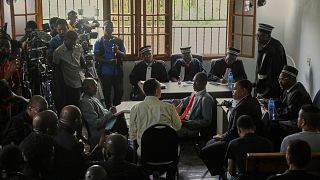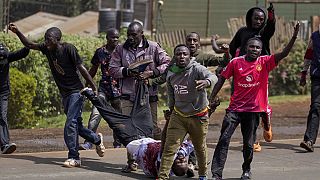Haiti
Kenya’s government has said it won't deploy its police officers to Haiti until all conditions on training and funding are met.
Last month the U.N Security Council gave its approval for Kenya to command a multinational mission to combat violent gangs in the troubled Caribbean country.
Interior Minister Kithure Kindiki told Parliament’s Departmental Committee on Administration and Internal Security that “unless all resources are mobilized and availed, our troops will not leave the country.”
He said U.N. member states are securing resources and have identified how funds will be mobilised and made available to Kenya for the mission. However, it was not immediately clear when the forces would be fully trained and funded to allow for deployment, or when they might be deployed.
Kindiki also tweeted that the "Deployment of National Police Service Officers to Haiti will neither compromise nor undermine the capacity and capability of the service to fulfil its mandate to secure citizens and their property."
Meanwhile, Haiti is reporting a fresh round of gang-related killings and kidnappings as it awaits help.
On Wednesday, Haiti’s Superior Court of Auditors and Administrative Disputes said five of its employees were kidnapped in the capital, Port-au-Prince, forcing the agency to temporarily postpone all hearings.
“The court hopes that the civil servants, who do not receive a salary that allows them to meet the financial demands of the kidnappers, will be quickly released,” it said in a statement.
Also this week, the U.N.’s International Organisation for Migration said that nearly 2,500 people in the coastal town of Mariani located west of the capital were displaced by violence as gangs infiltrate previously peaceful communities.
Nearly 200,000 Haitians have now lost their homes to gangs who pillage neighbourhoods operated by rivals in their quest to control more territory. Many of the displaced are now sleeping outside or in makeshift settlements that are crowded and extremely unsanitary.
The UN's children's agency says nearly five million Haitians are going hungry, partly because of the gang violence.
“In a country where security is not a priority for the government, each time you go out, you don’t know if you’re going to be shot at,” said Mario Volcy, a 40-year-old construction worker as he waited for a bus in Port-au-Prince. “These guys have machine guns in their hands. They could surprise you by doing something crazy and dumb.”
Volcy travels from his hometown of Les Cayes, west of Port-au-Prince, to the capital on public transportation amid fears that he could be killed or kidnapped. He said bus fares have spiked because drivers now must pay gangs a “toll” for safe passage.
More than 1,230 killings and 701 kidnappings were reported across Haiti from July 1 to Sept. 30, more than double the figure reported during the same period last year, according to the U.N.
Gangs continue to overwhelm Haiti’s National Police, which remains understaffed and underfunded despite the international community supplying training and resources. In late October, two more police officers were killed, according to a police union, with a total of 32 officers slain so far this year.
Haitian Prime Minister Ariel Henry first requested the immediate deployment of foreign armed forces more than a year ago, but it wasn’t until early October that the U.N. Security Council voted to send a non-U.N. multinational force to Haiti that would be funded by voluntary contributions.
But even if the Kenyan forces arrive, it won’t change much, said Pierre Espérance, executive director of the Haitian National Human Rights Defence Network.
“The biggest problem right now in Haiti is the absence of the government and rule of law, and also all key state institutions have collapsed, even the police,” he said. “How will the force be able to operate in Haiti if we don’t have a functional government?”
Espérance also noted Haiti’s government has long been linked to gangs, compounding the problem.
A spokesperson for the prime minister’s office did not immediately respond to a request for comment.











01:30
Top South African official accuses police minister of colluding with crime syndicates
01:35
UN and Haitian officials mark one year since Kenyan police arrived to support security efforts
01:02
Heavy police presence in Nairobi ahead of anniversary protests
01:09
Kenyan Police officers charged over death of blogger in custody
01:15
Kenya court sentences two to jail terms for aiding 2019 hotel attackk
01:47
Chinese city of Xuchang is world's biggest producer of wigs